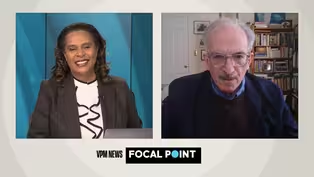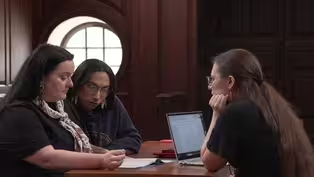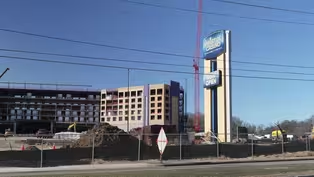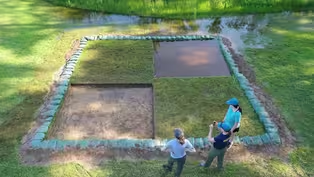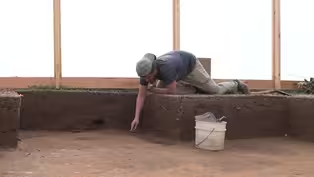VPM News Focal Point
The Quest for Federal Recognition
Clip: Season 3 Episode 4 | 7m 3sVideo has Closed Captions
Several Indigenous tribes are trying to gain federal recognition, but it isn’t easy.
Federal recognition allows Indigenous tribes to conduct a nation-to-nation relationship with the United States government, it is a path to unlocking grants, gaining administrative benefits and obtaining sovereignty. It's also a small step toward undoing generations of what some call “paper genocide” in Virginia – the state’s racial integrity laws denied the Indigenous existence for years.
Problems playing video? | Closed Captioning Feedback
Problems playing video? | Closed Captioning Feedback
VPM News Focal Point is a local public television program presented by VPM
The Estate of Mrs. Ann Lee Saunders Brown
VPM News Focal Point
The Quest for Federal Recognition
Clip: Season 3 Episode 4 | 7m 3sVideo has Closed Captions
Federal recognition allows Indigenous tribes to conduct a nation-to-nation relationship with the United States government, it is a path to unlocking grants, gaining administrative benefits and obtaining sovereignty. It's also a small step toward undoing generations of what some call “paper genocide” in Virginia – the state’s racial integrity laws denied the Indigenous existence for years.
Problems playing video? | Closed Captioning Feedback
How to Watch VPM News Focal Point
VPM News Focal Point is available to stream on pbs.org and the free PBS App, available on iPhone, Apple TV, Android TV, Android smartphones, Amazon Fire TV, Amazon Fire Tablet, Roku, Samsung Smart TV, and Vizio.
Providing Support for PBS.org
Learn Moreabout PBS online sponsorshipWAYNE ADKINS: We talk all the time about wondering what our ancestors would say if they could be here now, and see what has transpired, what has been accomplished, and just how proud we think they would be, hope they would be and- BILLY SHIELDS: When Wayne Adkins looks across this Providence Forge Cemetery, he sees markers for the remains of many of his tribal kin.
Adkins, his First Assistant Chief of the Chickahominy and he knows the history well.
WAYNE ADKINS: And we acknowledge them all the time.
We say, without them we wouldn't be here.
BILLY SHIELDS: And some of the names on these graves have also appeared in one infamous spot in Virginia's history, a list kept by Dr. Walter Plecker.
WAYNE ADKINS: It had the names of many of the tribal families.
If you go look at that list now, it's the same family names that you'll see in our tribes today.
BILLY SHIELDS: Indigenous groups call it the Walter Plecker Hit List.
Plecker was Virginia's first state registrar serving from 1912 to 1946.
The list appeared in the letter Plecker wrote, to registrars across Virginia, ordering them not to allow people with these names to be classified as Indigenous.
WAYNE ADKINS: That was only a small part of something that's called eugenics, that was worldwide.
BILLY SHIELDS: Eugenics was a movement intended to purify populations of people through sterilization, selective breeding, and other means of control.
In the 1943 letter, Plecker refers to the state's Indigenous people and notes, "We see the great mistake made in not stopping earlier the organized propagation of this racial falsehood."
Plecker gave instructions on how people were to be classified at birth as either white or Black, but not Indigenous.
BRAD HATCH: And what that law essentially did was created two groups of people in Virginia.
You could be either be identified as white or colored, and so at that point, anybody that was Indian had to fall into one of those two camps.
BILLY SHIELDS: And he listed specific surnames of families who did consider themselves Indigenous.
Plecker's work became known as paper genocide, a continuation of Virginia's infamous racial integrity law that went into effect 100 years ago.
He was a known supporter of that act, which derived from the eugenics movement.
It was a denial that many of the Indigenous people in the state even existed.
It is harm that many Indigenous people in Virginia are trying in part to reverse through federal recognition.
Being recognized as a legitimate tribal group is one key to unlocking grants and gaining sovereignty.
The Chickahominy have federal recognition, but for the Patawomecks, it's a different story.
CHIEF CHARLES BULLOCK: As you pan around this Potomac Creek area, all the land you see around Potomac Creek was a, our ancestors trod this land every day.
They never seen another human being until they, you know, made contact with John Smith, or John Smith, made contact with them.
BILLY SHIELDS: In an area just outside Fredericksburg, Chief Charles Bullock points to the lands around Potomac Creek.
Although many members of the Patawomeck Tribe own land adjacent to the creek, there are no longer tribal Patawomeck lands.
CHIEF CHARLES BULLOCK: All of the land that once, we inhabited it.
It just kind of went by the, it's gone by the wayside.
BRAD HATCH: Part of our issue is an issue that a lot of Indian tribes face.
The whole point of colonization is to erase the Indigenous presence on the landscape.
It's a whole lot easier to take other people's land if you come into a place and say like, "Well, these people don't exist and they never existed."
BILLY SHIELDS: The Patawomecks are in the midst of their own journey toward federal recognition.
A journey started some years ago, initially, to recover human remains of their members from the Smithsonian with who negotiations are ongoing.
CHIEF CHARLES BULLOCK: The health and educational benefits that's going to benefit our tribes, our tribal members in the future.
So that's huge.
BILLY SHIELDS: It is a process that can take decades, because it entails meticulous documentation regarding membership, governance and identification.
And there are three different ways to go about doing it, judicial, administrative, and legislative.
ABIGAIL SPANBERGER: When it comes to the Patawomeck, kind of the core central piece of our discussions has been that there's this tribe that was among the very first tribes to come in contact with European settlers when they arrived in what is now the United States, and what is now the Seventh District of Virginia.
And they have gone through the long and lengthy process of ensuring that the Commonwealth of Virginia understands their history, honors it through recognition as a state recognized tribe.
But the United States government doesn't yet recognize their history.
BILLY SHIELDS: Congresswoman Abigail Spanberger is sponsoring a bill that would offer recognition to the Patawomecks.
CHIEF CHARLES BULLOCK: She kind of took the bull by the horns per se, and took the ball and run with it.
And she has been a champion for the Potomac Tribe.
BILLY SHIELDS: Spanberger says, A common misconception is that the main purpose of federal recognition is that it will open the door to establishing casinos.
ABIGAIL SPANBERGER: I think it's actually really unfortunate from an overall perspective of understanding history that so many people are conditioned to think, you know, Native American tribe or recognition of a Native American tribe equals a casino.
BILLY SHIELDS: 2018 was a watershed year for six of Virginia's tribes when President Donald Trump signed into law a bill recognizing tribes like the Rappahannock, the Nansemond, and the Chickahominy.
Since that time, several tribes have been able to reacquire and protect the ancestral land from development and as sovereign governments provide services for members.
WAYNE ADKINS: The biggest things is just the resources that are now available that we didn't have before.
And some of that is financial, some of it is more technical assistance on how to operate programs or how to run your government or just various other things.
But a lot of it is about financial resources.
BILLY SHIELDS: Before the Chickahominy had to build its tribal center with donations from its members, now it has access to federal grant money.
WAYNE ADKINS: It validated who we are.
I mean, so many people had lost faith and said, "It'll never happen.
You know, you're wasting your time, you're wasting your money."
(chuckles) And we just kept the faith.
BILLY SHIELDS: The Patawomecks are still doing just that, keeping the faith that their people will be officially recognized.
CHIEF CHARLES BULLOCK: No one has that crystal ball.
I know from past history that it's, the timing has to be perfect and we're just, we're in the mode of hurry up and wait.
BILLY SHIELDS: Waiting for validation of who they are and always have been.
Archaeology helping to preserve sacred spaces
Video has Closed Captions
Clip: S3 Ep4 | 8m 29s | Archaeology is providing Virginia’s tribes with protection for their sacred spaces. (8m 29s)
Video has Closed Captions
Clip: S3 Ep4 | 3m 21s | A group of women from native tribes in Virginia are working to revive Algonquian language. (3m 21s)
Indigenous tribes bring casino gaming to Virginia
Video has Closed Captions
Clip: S3 Ep4 | 2m 11s | Virginia localities have introduced casinos and more are on the way (2m 11s)
Jamestown under threat from rising water
Video has Closed Captions
Clip: S3 Ep4 | 3m 1s | Rising water from climate change threatens to wash away Jamestown. (3m 1s)
Uncovering Indigenous history at Jamestown
Video has Closed Captions
Clip: S3 Ep4 | 4m 28s | Archaeology is setting the story straight about the shared history at Jamestown. (4m 28s)
Providing Support for PBS.org
Learn Moreabout PBS online sponsorship
- News and Public Affairs

Top journalists deliver compelling original analysis of the hour's headlines.

- News and Public Affairs

FRONTLINE is investigative journalism that questions, explains and changes our world.












Support for PBS provided by:
VPM News Focal Point is a local public television program presented by VPM
The Estate of Mrs. Ann Lee Saunders Brown
